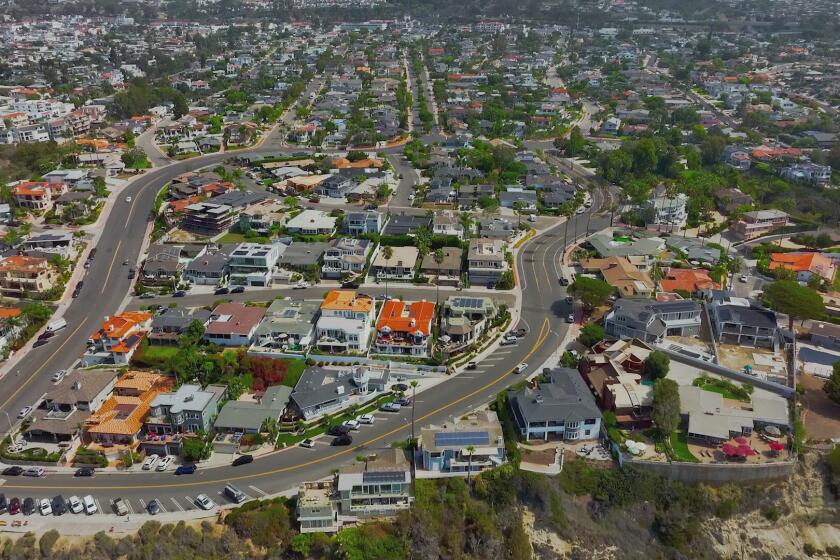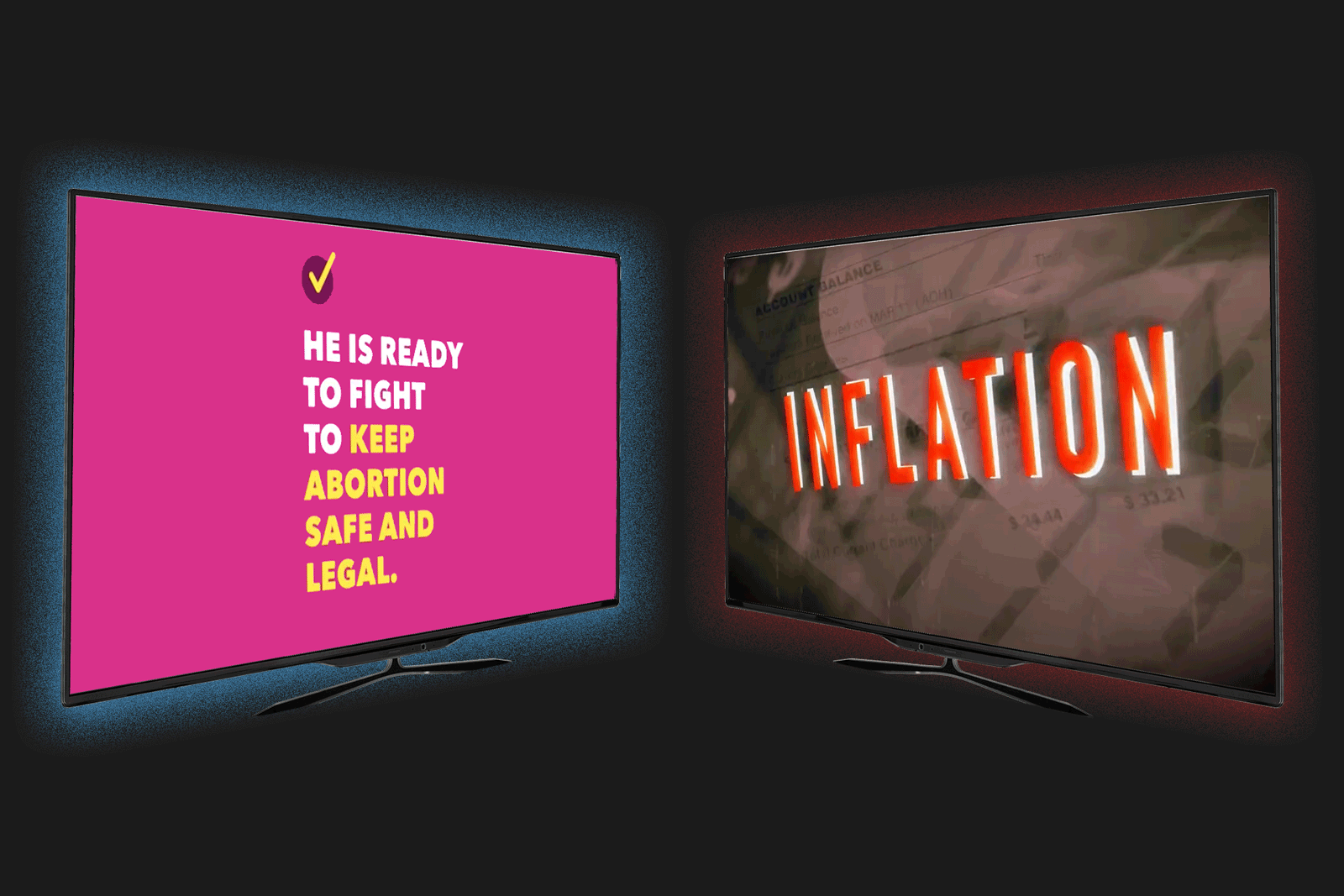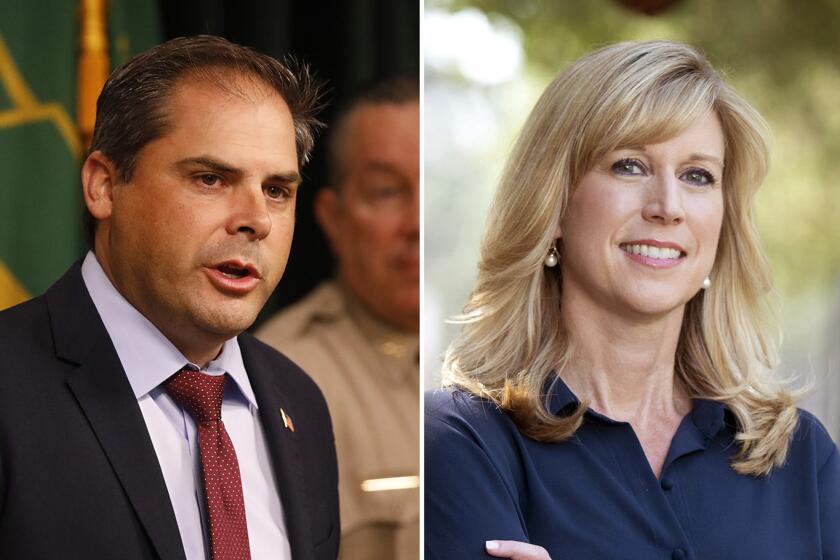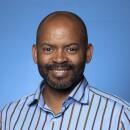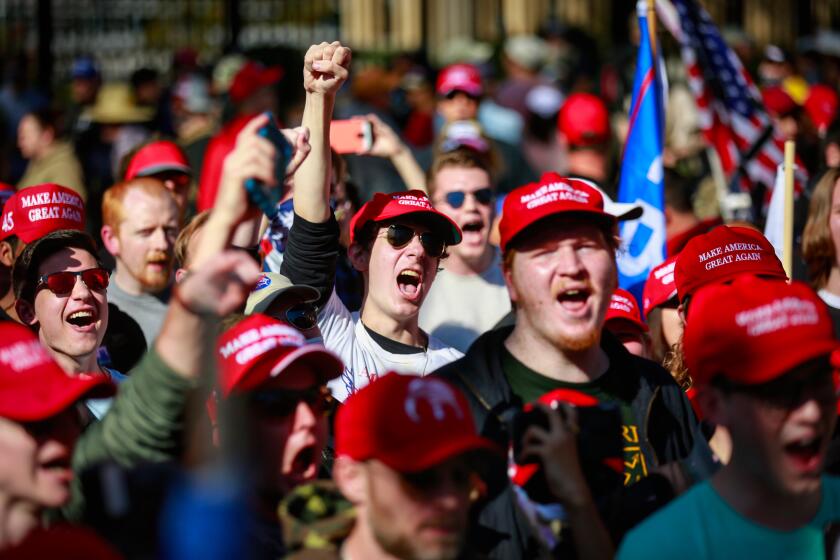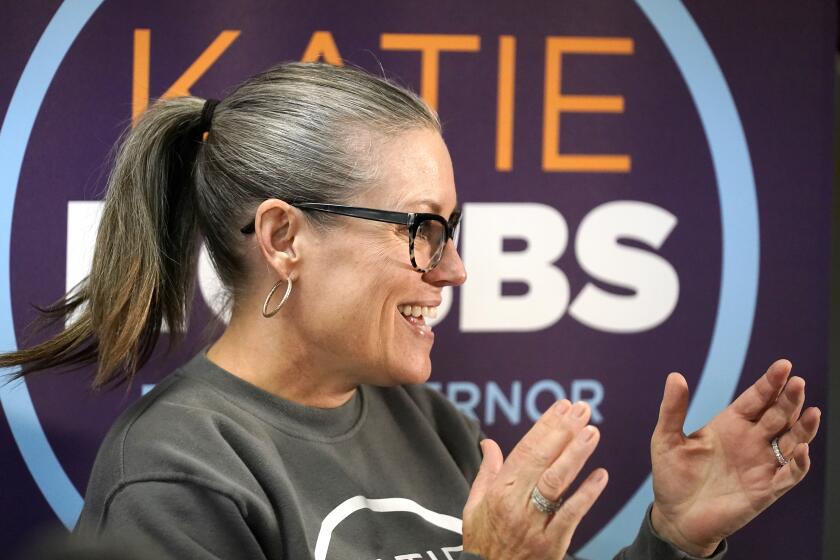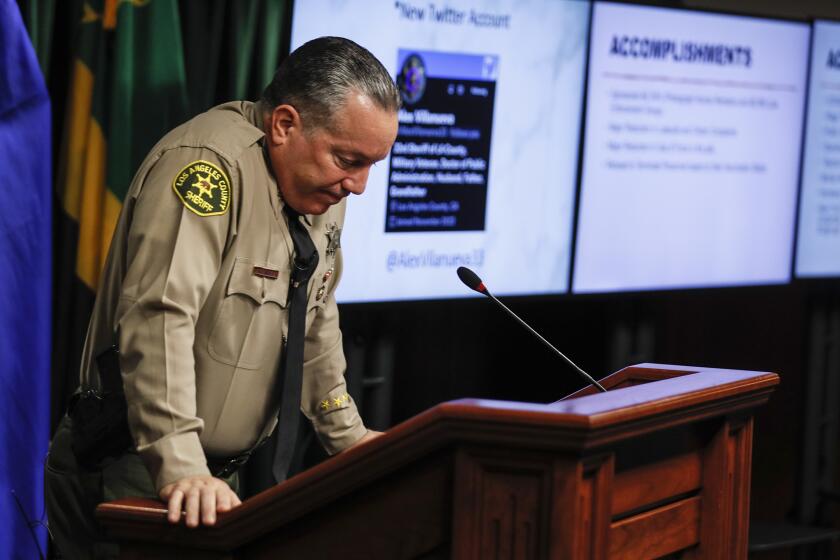‘We’re broken.’ In the suburbs north of Los Angeles, voters feel fed up and afraid
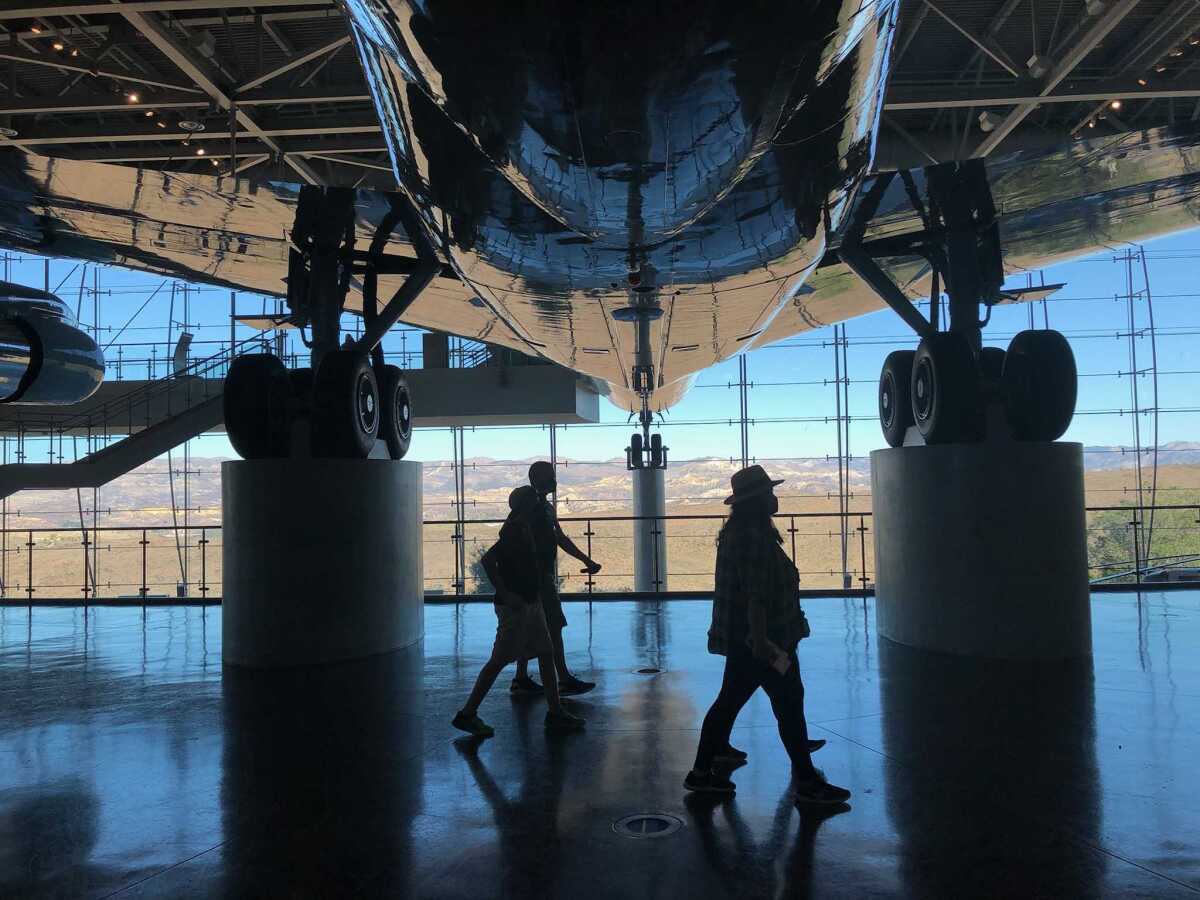
- Share via
Sergio Amalfitano’s attitude about the country is as dark and brooding as the name of his vinyl record shop in downtown San Fernando — the Midnight Hour.
He and his wife, Alyssa Castro Amalfitano, who owns a boutique two doors away, say they’re so disenchanted with politicians’ failure to bring Americans together and to make life better for Californians that they’re considering not voting in the November election.
“Everyone is fed up,” says Sergio, 37. “All you can do is work hard, try to make a living and stay in your lane.”
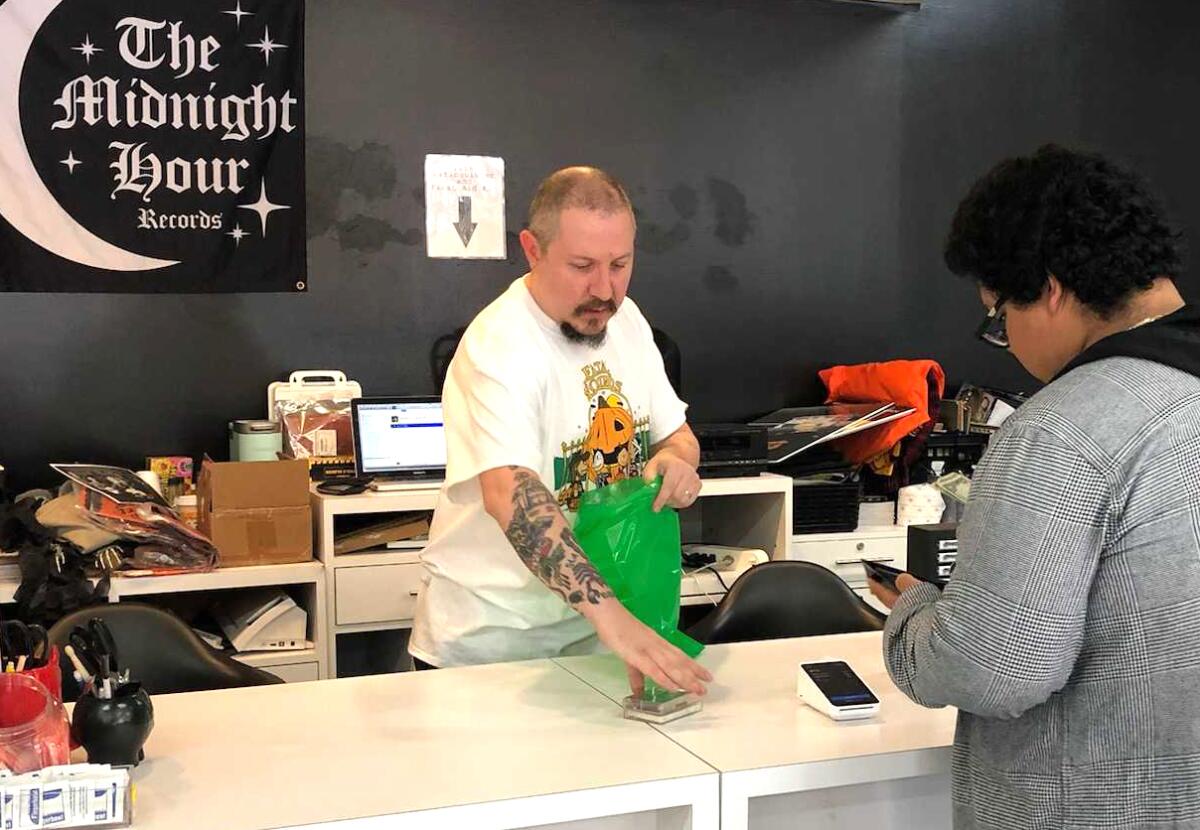
No matter where you venture along the northern fringe of metro Los Angeles, whether it’s the bustling suburbs of the Democratic-leaning San Fernando Valley or the more conservative towns that nestle in the russet-hued canyons to the north and east, you’ll find people who say they have good reason to sing the blues for their country.
They’re feeling weighed down by the onslaught of inflation, cultural conflicts and assaults on the electoral process. They fear that Americans — left, right and center — have given up trying to understand or sympathize with one another.

America Unsettled
In a deeply divided nation, the one thing unifying Americans is a shared sense of unease. A vast majority believe the country is heading in the wrong direction, but fewer agree on why that is — and which political party is to blame.
This occasional series, America Unsettled, examines the complicated reasons behind voters’ decisions in this momentous and unpredictable midterm election.
And they hold elected officials and political candidates responsible for sowing distrust among Americans and eroding faith in democratic institutions.
While Sergio, who identifies with the left but doesn’t align with a political party, understands that sitting out the election could lead to victories by candidates he detests, he rejects the idea that gritting your teeth and choosing “the lesser of two evils,” as some of his friends plan to do, is a better option.
“What does that say about democracy?” he says.
On San Fernando’s old-school commercial strip, amid shops selling furniture, quinceañera gowns and cowboy attire, Alyssa keeps watch over her vintage boutique, Cry Baby’s Rodeo. It’s painted all in pink and sells country and western clothing, home goods, stationery, peppermint swirl lollipops and paintings of clowns. Tammy Wynette croons on the sound system.
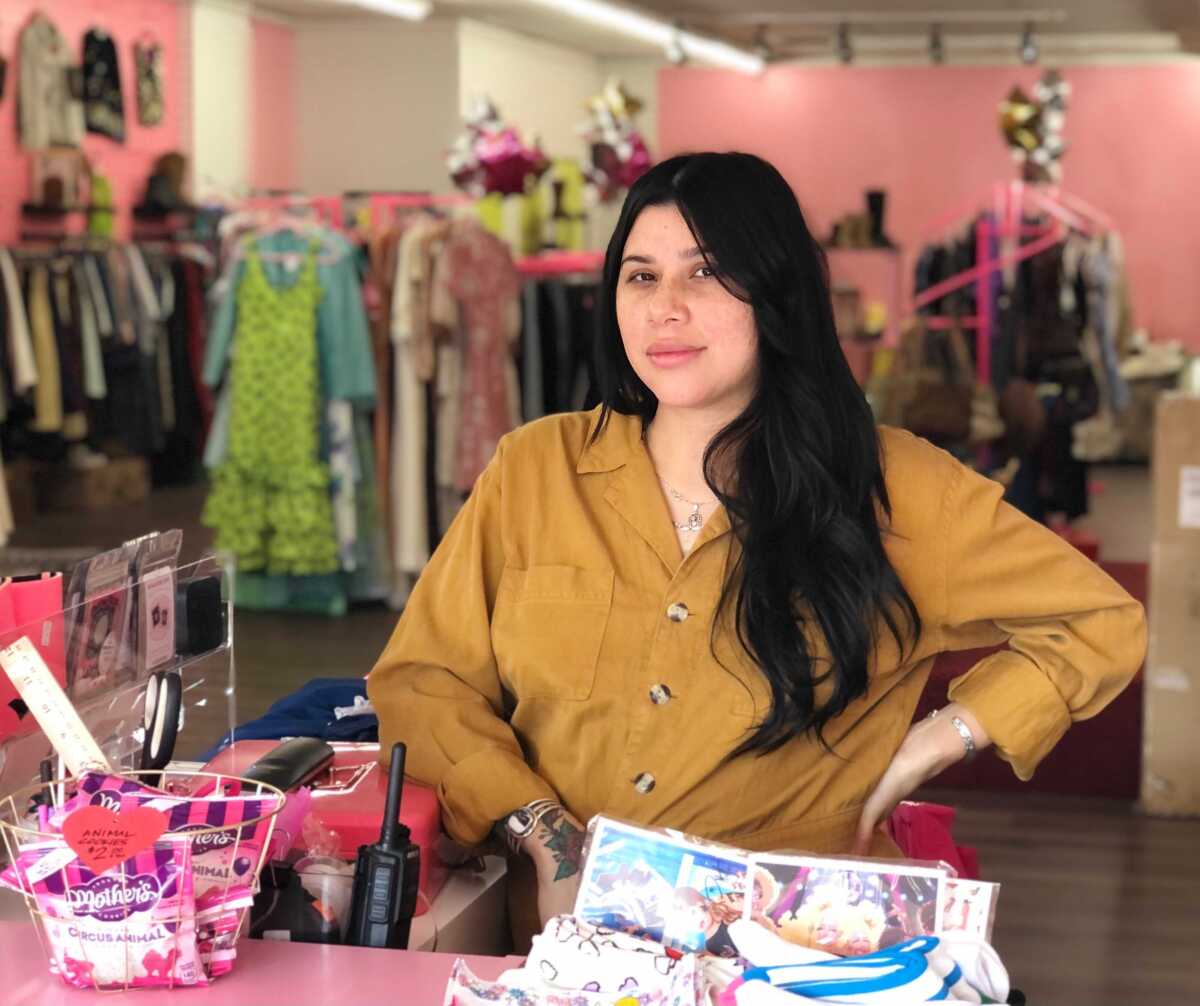
The 33-year-old rests her hands on her belly. The couple’s twin daughters will soon have a new sibling.
Despite the pregnancy and her store’s cheerful ambiance, Alyssa, a political independent, feels hopeless.
Given the high cost of living in Southern California and global dangers such as climate change, she’s found herself asking a wrenching question as an expectant mother: “Do I want to bring somebody into this new world? Do we know where it’s going? I don’t.”
The daughter of Mexican immigrants, Alyssa says her family goes back three generations in this corner of the valley. She tears up when talking about how unfair it is that many people she knows work two or three jobs yet can’t seem to rise into the middle class.
“It’s hard to see the fear and the struggle in my neighborhood,” Alyssa says of where she grew up. “They shouldn’t be worrying as much as they are.”
Gas prices worry voters in this coastal California House district, home to many commuters. It’s part of a debate over climate change and energy policy.
Adversity and hustle are evident everywhere you turn. On thoroughfares such as Glenoaks Boulevard in L.A.’s working-class Latino neighborhood of Pacoima, vendors hawk tamales, tacos and freshly chopped coconuts on the sidewalks, and residents sell secondhand toys, clothes and knickknacks from their frontyards.
Ruben Medrano looks hot and tired while waving a dark translucent panel to attract customers to the window-tinting service he and his business partner operate in a friendly homeowner’s driveway. Medrano, 23, says their storefront shop in Anaheim closed during the pandemic economic downturn, so they’ve been reduced to flagging down business curbside.
Behind a Valero gas station, at a recycling depot, a steady stream of motorists pull in with garbage bags full of aluminum cans and plastic bottles to sell. With inflation running high, the young manager says, he’s seeing his regular recycling customers returning more frequently, as well as plenty of new customers looking to earn a few extra dollars to help pay bills.
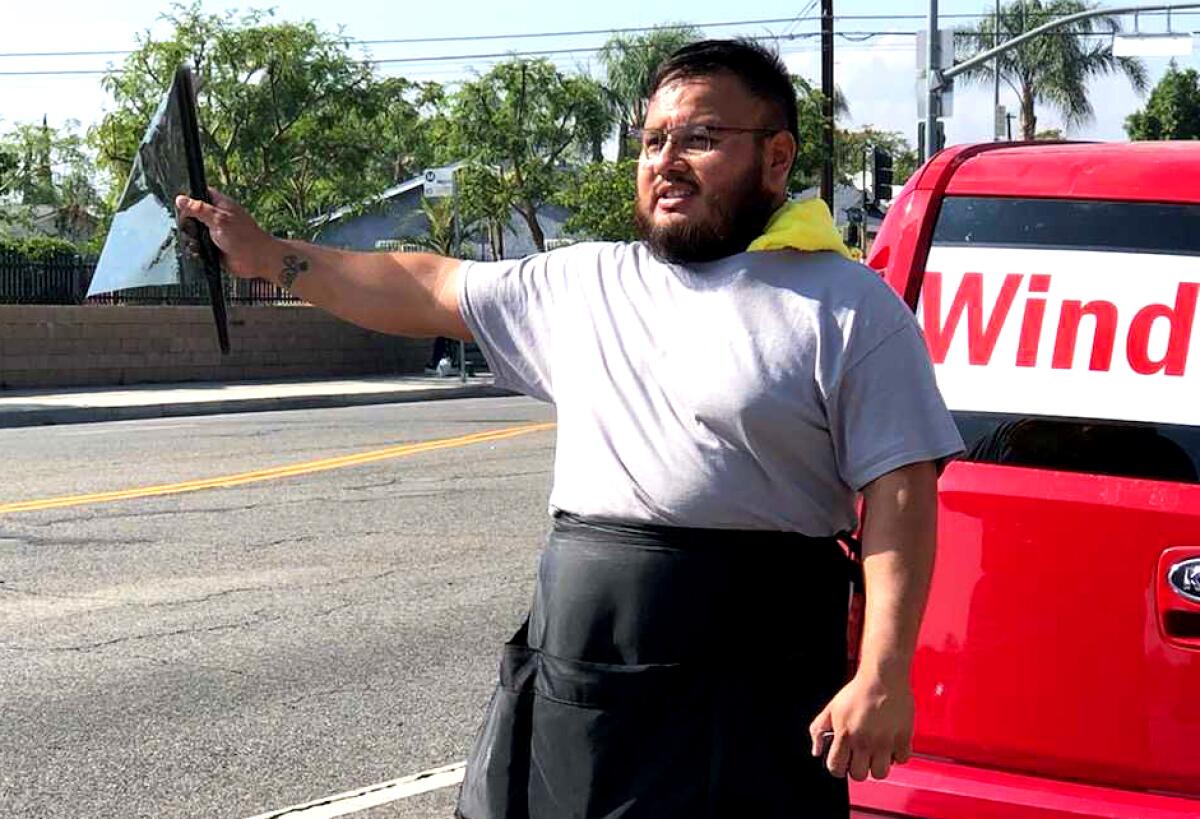
“I’m talking to friends and people my age and just feeling so sad how hard it is for them to even find housing,” Alyssa says.
Her husband, the record shop owner, isn’t convinced that elected officials care about the needs of everyday Californians like these.
He says his cynicism was hardened by the leaked audio of then-L.A. City Council President Nury Martinez, a San Fernando High School graduate, using racist and degrading language to describe Angelenos and some of her fellow elected officials during a discussion about local redistricting. She resigned in the uproar that followed.
In California election ads, Democrats running for Congress spotlight abortion access after Roe vs. Wade’s overturn; Republicans focus on inflation.
“Democrats and Republicans both seem to be wolves,” Sergio says. “One of them just happens to be wolves in sheep’s clothing — the Democrats.”
Frances Cantella has an equally grim view. As she finishes her lunch at a cafe in Santa Clarita that’s surrounded by single-story homes on spotless streets, she reflects on how former President Trump normalized what she calls “ugly behavior” by politicians.
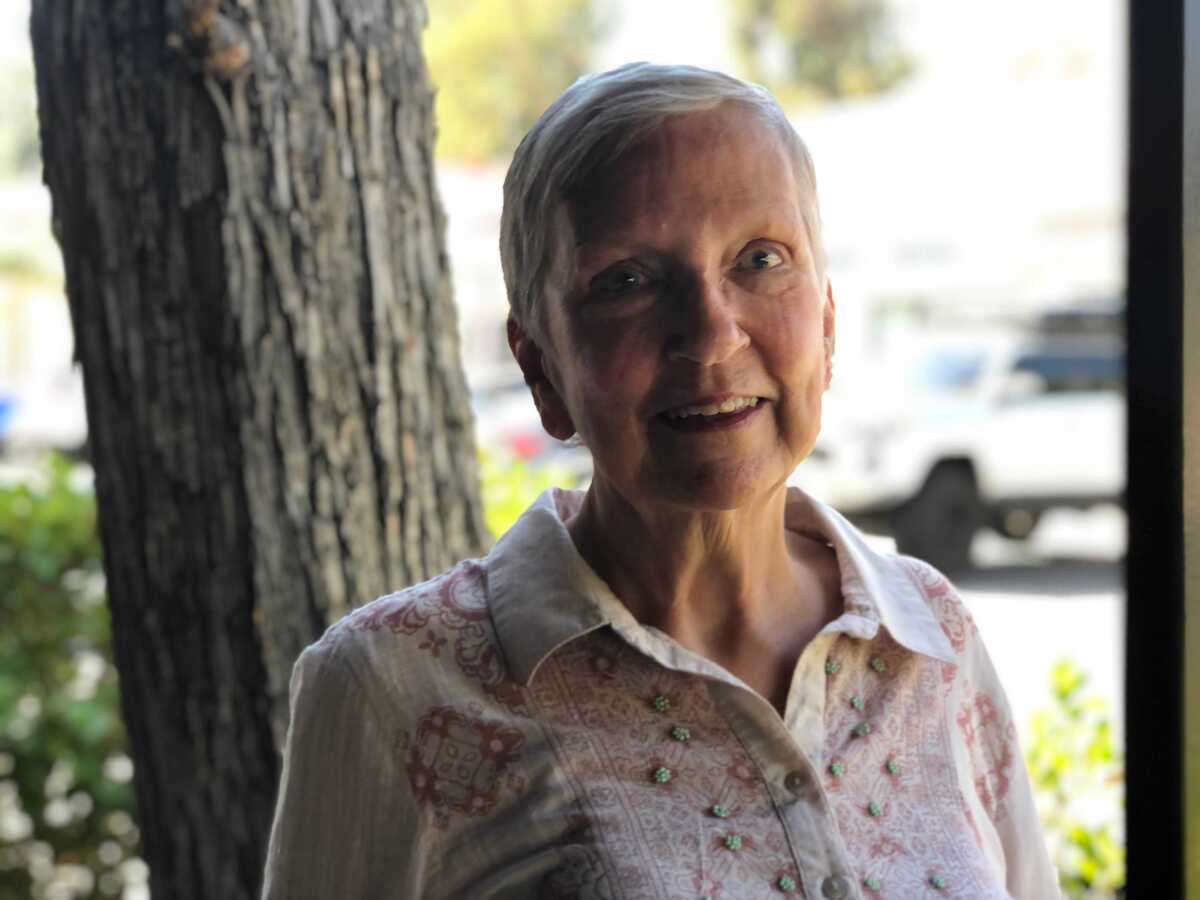
Cantella frets so much about the fate of democracy that she wears earbuds to bed, hoping that soothing jazz will drown out her thoughts of the demonization, name-calling and conspiracy theories that seem to have taken hold in American life.
“We’re broken,” says Cantella, a 75-year-old retired NBC employee who lives in the neighboring unincorporated community of Val Verde.
“Nobody works together,” she says. “Nobody cares about what somebody else is thinking.”
A resident of the 27th Congressional District and proud progressive, she plans to vote for Democrat Christy Smith in hopes of helping her unseat Republican incumbent Mike Garcia.
California midterm election: Here’s where Rep. Mike Garcia and challenger Christy Smith stand on economy, abortion, homelessness, the 2020 election.
Cantella thinks that no matter who emerges victorious in that race, or which party prevails in the battle for control of Congress, nobody wins in a society that’s careening with “not much of a guardrail.”
She blames conservatives for not cracking down hard enough on racists and conspiracy-mongers in their ranks, but she’s also disturbed to see progressives fuel hostilities by posting inflammatory comments about Republicans on social media. Her biggest fear is violence breaking out after the midterm election if the results come under dispute.
“We need to figure out how to deal with each other,” says Cantella, who’s also an ordained minister. “I still need to care about the people whose ideas are abhorrent to me.”
The concept of opposing sides joining forces for the good of democracy feels almost quaint in an era when election deniers stormed the U.S. Capitol while Trump reportedly watched the deadly riot on TV.
At the hilltop Ronald Reagan Presidential Library in Simi Valley, about a half-hour drive west of San Fernando and Santa Clarita, Republicans and Democrats alike come to immerse themselves in the mystique of a bygone time when citizens and their leaders could agree on who won or lost a vote. Even here, some Californians are downbeat.
“All of the politicians today seem to be out for themselves — period — not for who they represent,” says Cathy, a retiree from the Coachella Valley. She didn’t want to give her last name — just talking politics to a reporter feels risky in a society on edge.
She and her husband, who stands at her side, are loyal Republicans. They blame President Biden for the skyrocketing inflation. But they believe both parties lack members who possess “integrity and patriotism.”
Tony and Janette Negron of Santa Clarita echo that point of view. The Democrats brought their children, Giovanni, 12, and Arianna, 7, to teach them about history and instill a broader lesson — “not to judge somebody based off of their political decisions.”
As visitors take selfies next to statues and photos of the “Great Communicator” and First Lady Nancy Reagan, the Negrons marvel at the vintage presidential limousine and stroll under the massive Air Force One passenger jet that flew President Reagan around the world. The plane stands in a cavernous gallery with a panoramic view of boulder-strewn hills and the ranches below them.
Reagan described the U.S. as a “shining city on a hill,” a beacon of liberty for the world. Looking out from the library’s lofty perch, the Negrons see a nation falling from grace.
A welcome calm greets newcomers to the Inland Empire, who come to seek their version of the American dream.
Janette Negron, 40, says she’s disappointed that Biden, whom she voted for, hasn’t made more progress on his vow to unite his fellow citizens and help them remember what they share in common.
“Even within families, it’s hard,” she says. “My husband — his family is almost all Republican.”
With the GOP poised to reclaim control of at least one house of Congress if the party performs as expected in the midterms, the Negrons are even more doubtful that reconciliation is possible.
“We need to take politics out of normal life and just go back to ‘people are people,’” says Tony Negron, 40. “Unfortunately, with the division that we’ve encountered, I think it’s going to be a long road before we can get back that way.”
The message on the T-shirt that Arianna wears, “Be your best self,” echoes a Reagan quote that’s printed in large type inside the museum: “America’s best days are yet to come. Our proudest moments are yet to be. Our most glorious achievements are just ahead.”
Back in the San Fernando Valley, the Amalfitanos say they strive to be civic-minded citizens in their own way. The couple helped with the campaign to bring an LGBTQ pride parade to San Fernando. Sergio plans to use his music shop to host a punk rock concert that will double as a holiday toy drive.
Alyssa wonders how an entire country can be its best when it is mired in discord, uncertainty and gloom.
“There’s nothing I can see” to feel good about, she says, staring out the window of her shop on a cloudless day.
When it comes to the nation’s future, she says, “everything is foggy.”
More to Read
Get the L.A. Times Politics newsletter
Deeply reported insights into legislation, politics and policy from Sacramento, Washington and beyond. In your inbox twice per week.
You may occasionally receive promotional content from the Los Angeles Times.
